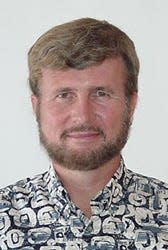Consider how similar Vladimir Putin is to Adolf Hitler to understand threat to world peace
- Oops!Something went wrong.Please try again later.
The events in Ukraine over the past couple of months have become tragically reminiscent of what transpired in Europe in the late 1930s, when a right-wing German dictator began invading his neighbors and committing atrocities. Is Vladimir Putin the new Adolf Hitler? Is Russia a fascist danger to world peace, as was Nazi Germany? The parallels are disturbingly similar.
At the beginnings of their political careers, both were legitimately elected to lead their countries. However, subsequently both managed, through Machiavellian maneuvering, to gain dictatorial control over their populations, ultimately subverting and destroying whatever democratic processes remained in their respective nations. Both consolidated power by intimidating any opposition. Challenges were met with severe repression. Protest demonstrations were disbanded by the police, and participants often detained. Opposition leaders were arrested and sometimes even assassinated.
Both dictators used propaganda to gain the support of their populations, taking control of the media and prohibiting the dissemination of opposing viewpoints. Both claimed their people to be exceptional, a special race with an illustrious history and long tradition of greatness. Both also claimed that their countries had been historically wronged in prior decades and thereby not given the respect they were due by the international community. Both leaders promoted a highly patriotic vision of their country, whose former ascendancy needed to be reinstated. Both insisted that their nations were surrounded by enemies that threatened their integrity. Both espoused an expansionist policy for their respective countries, justifying their right to control and exploit those within their spheres of influence, establishing puppet regimes to do their bidding.
Drew Tiene: In Ukraine and previous wars, civilian bombings are key component in Putin's playbook
Both leaders sought allies among other autocratic states, Hitler with Italy and Japan and Putin with China and India. Both increased the size and sophistication of their nations' armed forces. Both were willing to send those forces into battle when it suited them. Both launched unilateral, unprovoked invasions of neighboring countries. In both cases, these invasions ultimately led to other countries becoming involved, in order to stop the aggression and discourage future expansion of hostilities.
Their approach to war was especially brutal, for it was not confined to direct combat between opposition forces. It included the widespread destruction of civilian property and public institutions. Entire cities could be practically destroyed by bombardment in the process. These barbarities involved widespread killing of noncombatants, including women, children and the elderly. Populations that fell under the control of their military forces were brutalized. Human right abuses were perpetrated upon those in occupied zones, with scores of arbitrary arrests, rapes, and executions.
Podcast: Upending peace: Hear University of Akron professor talk about Russia's invasion of Ukraine
Some might assume that Putin is a communist, not a fascist. After all, he grew up in the Soviet Union and was a high-ranking member of its feared secret service, the KGB. However, he is disinterested in Marxist ideology and actually has become one of the world’s richest capitalists.
While he seeks to restore Moscow’s rule over the territories of the former Soviet Union and its influence across Eastern Europe, Putin’s political model is Imperial Russia, not the moribund Union of Soviet Socialist Republics. He wants to annex these lands, not reestablish those “republics” (hence his claims that Ukraine was never a separate country, apart from Russia).
Communist leaders like Lenin and Stalin are not Putin's heroes. Instead, he admires Russia’s monarchs, Czar Peter the Great and Czarina Catherine the Great. He aspires to become “Vladimir the Great.” However, since the days of absolute monarchy are over, he will have to settle instead for being Hitler 2.0.
Vladimir Putin keeps making the specious claim that he is fighting Nazis in Ukraine, despite the fact the its leader, Volodymyr Zelenskyy, is a Jew who lost family members in the Holocaust and Ukrainian neo-Nazis are a minor fringe group, at best. In reality, it is Putin, not Zelenskyy, who is the new Hitler. The Z-shaped symbol emblazoned on Russian military vehicles can be likened to the Nazi swastika.
Reaction: Letters to the editor: United messaging on Vladimir Putin needed; support for Ukraine
Sometimes history repeats itself, and this new era of global politics feels similar to the fight against fascism that engulfed the planet during World War II. If that effort was necessary for democracy to prevail, it seems that the democracies of the world, especially those in Europe, need to stand up to this latest international bully, Vladimir Putin, just as they did to his predecessor, Adolf Hitler. Like Hitler’s Thousand Year Reich, Putin’s dreams of Ukrainian conquest will hopefully end in defeat (or should I say "Gotterdammerung").
Drew Tiene is a Kent State University professor emeritus.

This article originally appeared on Akron Beacon Journal: Opinion: War in Ukraine shows how Vladimir Putin is like Hitler
